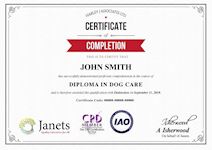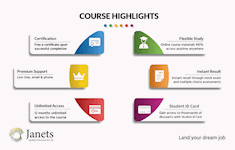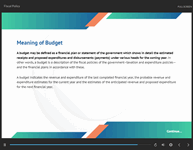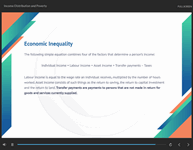Economics Training Diploma - CPD Certified
FREE PDF Certificate | Audio Visual Training | 10 CPD Points | Tutor Support | 1 Year Access
Janets
Summary
- Tutor is available to students
Add to basket or enquire
Overview
Follow your dreams by enrolling on the Economics course today and develop the experience, skills and knowledge you need to enhance your professional development. Economics will help you arm yourself with the qualities you need to work towards your dream job.
Study the Economics training course online with Janets through our online learning platform and take the first steps towards a successful long-term career. The Economics course will allow you to enhance your CV, impress potential employers, and stand out from the crowd.
This Economics course consists of a number of easy to digest, in-depth modules, designed to provide you with a detailed, expert level of knowledge. Study the Economics course through a mixture of instructional video lessons and online study materials.
Receive online tutor support as you study the Economics course, to ensure you are supported every step of the way. Get a free e-certificate as proof of your Economics course completion.
Janets is one of the top online training course providers in the UK, and we want to make education accessible to everyone! Learn the essential skills you need to succeed and build a better future for yourself with the Economics course. The Economics course is designed by industry experts and is tailored to help you learn new skills with ease.
The Economics is incredibly great value and allows you to study at your own pace. With full course access for one year, you can complete the Economics when it suits you. Access the Economics course modules from any internet-enabled device, including computers, tablets, and smartphones.
The Economics course is designed to increase your employability and equip you with everything you need to be a success. Enrol on the Economics now and start learning instantly!
What You Get Out Of Studying Economics With Janets
- Free PDF certificate upon successful completion of the Economics
- Full one-year access to Economics Course materials
- Full tutor support available from Monday to Friday with the Economics
- Study the Economics at your own pace
- Accessible, informative modules taught by expert instructors
- Get 24/7 help or advice from our email and live chat teams with the Economics
- Study the Economics in your own time through your computer, tablet or mobile device
- Improve your chance of gaining professional skills and better earning potential by completing the Economics
CPD
Course media
Description
The Economics training course is delivered through Janets’ online learning platform. Access the Economics content from any internet-enabled device whenever or wherever you want to. The Economics course has no formal teaching deadlines, meaning you are free to complete the course at your own pace.
Economics Course Curriculum:
Module 01: An Introduction to Economics
- Basic Definitions to Start With
- Scarcity and Choice
- Goods and Bads
- Ceteris Paribus
- Definition of Economics
- Factors of Production
- Categories of Economics
- Positive and Normative Economics
- Microeconomics and Macroeconomics
- Production Possibilities Frontier Framework
- The Straight-Line PPF
- The Concave-Downward PPF
- Law of Increasing Opportunity Costs
- A Budget Line
Module 02: The Market System and the Circular Flow Model
- The Market System
- Characteristics of the Market System
- Private Property
- Freedom of Enterprise and Choice
- Self-Interest
- Competition
- Markets and Prices
- Specialisation
- Use of Money
- Active, but Limited, Government
- The “Invisible Hand”
- The Circular Flow Model
Module 03: Supply, Demand and Prices
- What Is Demand?
- The Demand Curve
- Individual Demand Curve vs Market Demand Curve
- Factors Causing the Demand Curve to Shift
- What Is Supply?
- The Law of Supply
- Factors Causing the Supply Curve to Shift
- A Change in Supply vs a Change in Quantity Supplied
- A Few Important Terms Related to Supply and Demand
- Equilibrium Price and Quantity
- Equilibrium in Terms of Consumers’ and Producers’ Surplus
Module 04: Prices
- Two Major Jobs of Price
- Price as a Rationing Device
- Price as a Transmitter of Information
- Price Controls
- Price Ceiling
- Price Floor
- Effects of Price Ceiling
- Shortages
- Fewer Exchanges
- Nonprice-Rationing Devices
- Buying and Selling at a Prohibited Price
- Tie-In Sales
- Effects of a Price Floor
- Surpluses
- Fewer Exchanges
- Absolute Price and Relative Price
Module 05: Elasticity
- Price Elasticity of Demand
- Formula for Calculating Price Elasticity of Demand
- From Perfectly Elastic to Perfectly Inelastic Demand
- Price Elasticity of Demand and Total Revenue
- Determinants of Price Elasticity of Demand
- Number of Substitutes
- Necessities Versus Luxuries
- Percentage of One’s Budget Spent on the Good
- Time
- Applications of Price Elasticity of Demand
- Large Crop Yields
- Excise Taxes
- Cross Elasticity of Demand
- Income Elasticity of Demand
- Price Elasticity of Supply
- Price Elasticity of Supply and Time
Module 06: Market Failures
- Market Failures in Competitive Markets
- Demand-Side Market Failures
- Supply-Side Market Failures
- Efficiently Functioning Markets
- Public Goods
- Externalities
- Internalising Externalities
- Persuasion
- Taxes and Subsidies
- Assigning Property Rights
- Voluntary Agreements
- Asymmetric Information
- Adverse Selection
- Moral Hazard
- Government’s Role in the Economy
Module 07: Production and Costs
- The Market and the Firm
- Two Sides to Every Business Firm
- Explicit and Implicit Cost
- Accounting Profit vs Economic Profit
- Zero Economic Profit
- Production
- Long Run vs Short Run
- Production in the Short Run
- Some Economic Cost Concepts
- Average Productivity
- Costs of Production: Total, Average, Marginal
- Sunk Cost
- Economies of Scale, Diseconomies of Scale and Constant Returns to Scale
Module 08: Market Structure: Perfect Competition vs Monopoly
- The Theory of Perfect Competition
- Demand Curve for a Perfectly Competitive Firm
- Marginal Revenue Curve of a Perfectly Competitive Firm
- Profit Maximization in the Short Run
- To Produce or Not to Produce
- Case 1
- Price Is Above Average Total Cost
- Case 2
- Price Is Below Average Variable Cost
- Case 3
- Price Is Below Average Total Cost but Above Average Variable Cost
- The Theory of Monopoly
- Barriers to Entry
- The Monopolist’s Demand and Marginal Revenue
- Perfect Competition vs Monopoly
- Price Discrimination
Module 09: Money, Banking and the Financial System
- The Meaning of Money
- Functions of Money
- Defining the Money Supply
- Commercial Banks
- Central Bank
- The Bank’s Balance Sheet
- The Financial System
Module 10: Measuring GDP and Economic Growth
- GDP Defined
- The Circular Flow of Expenditure and Income Revisited
- GDP Equals Expenditure Equals Income
- Measuring UK GDP
- The Expenditure Approach
- The Income Approach
- Nominal GDP and Real GDP
- Computing Real GDP
- Limitations of Real GDP
- Economic Growth
- Calculating Growth Rates
Module 11: Unemployment
- Why Unemployment Is a Problem
- Who Are the Unemployed?
- Three Labour Market Indicators
- Frictional Unemployment
- Structural Unemployment
- Natural Unemployment
Module 12: Inflation
- The Price Level
- Why Inflation and Deflation Are Problems?
- Computing the Price Level
- Measuring the Inflation Rate
- The GDP Deflator
Module 13: Income Distribution and Poverty
- Economic Inequality
- Measuring Income Equality
- Factors Contributing to Income Inequality
- Poverty
Module 14: International Finance
- The Foreign Exchange Market
- Appreciation and Depreciation of Exchange Rates
- The Demand for, and Supply of, Currencies
- Market Equilibrium
- Flexible vs Fixed Exchange Rates
- The Current System
Module 15: Fiscal Policy
- Meaning of Budget
- Sources of Government Expenditures and Revenue
- Income Tax Structures
- Budget Deficit, Surplus, or Balance
- Valued-Added Tax
- Aggregate Demand
- Aggregate Supply
- Some Relevant Fiscal Policy Terms
- Demand-Side Fiscal Policy
- Shifting the Aggregate Demand Curve
- Crowding Out
- Supply-Side Fiscal Policy
Who is this course for?
The Economics is ideal for those who already work in this sector or are an aspiring professional. This Economics course is designed to enhance your expertise and boost your CV. Learn key skills and gain a Certificate of Achievement to prove your newly-acquired knowledge.
Certification
All students who successfully complete the Economics course can instantly download their free e-certificate. You can also purchase a hard copy of the Economics course certificate, which will be delivered by post for £9.99.
Requirements
The Economics is open to all students and has no formal entry requirements. To study the Economics course, all you need is a passion for learning, a good understanding of English, numeracy, and IT skills. You must also be over the age of 16.
Career path
This Economics course will assist you to get your desired job in the relevant field. The course will also progress your career, regardless of your present job status. You could explore a number of job roles for you to fill as you complete this Economics course.
Questions and answers
Currently there are no Q&As for this course. Be the first to ask a question.
Reviews
Currently there are no reviews for this course. Be the first to leave a review.
Legal information
This course is advertised on reed.co.uk by the Course Provider, whose terms and conditions apply. Purchases are made directly from the Course Provider, and as such, content and materials are supplied by the Course Provider directly. Reed is acting as agent and not reseller in relation to this course. Reed's only responsibility is to facilitate your payment for the course. It is your responsibility to review and agree to the Course Provider's terms and conditions and satisfy yourself as to the suitability of the course you intend to purchase. Reed will not have any responsibility for the content of the course and/or associated materials.






